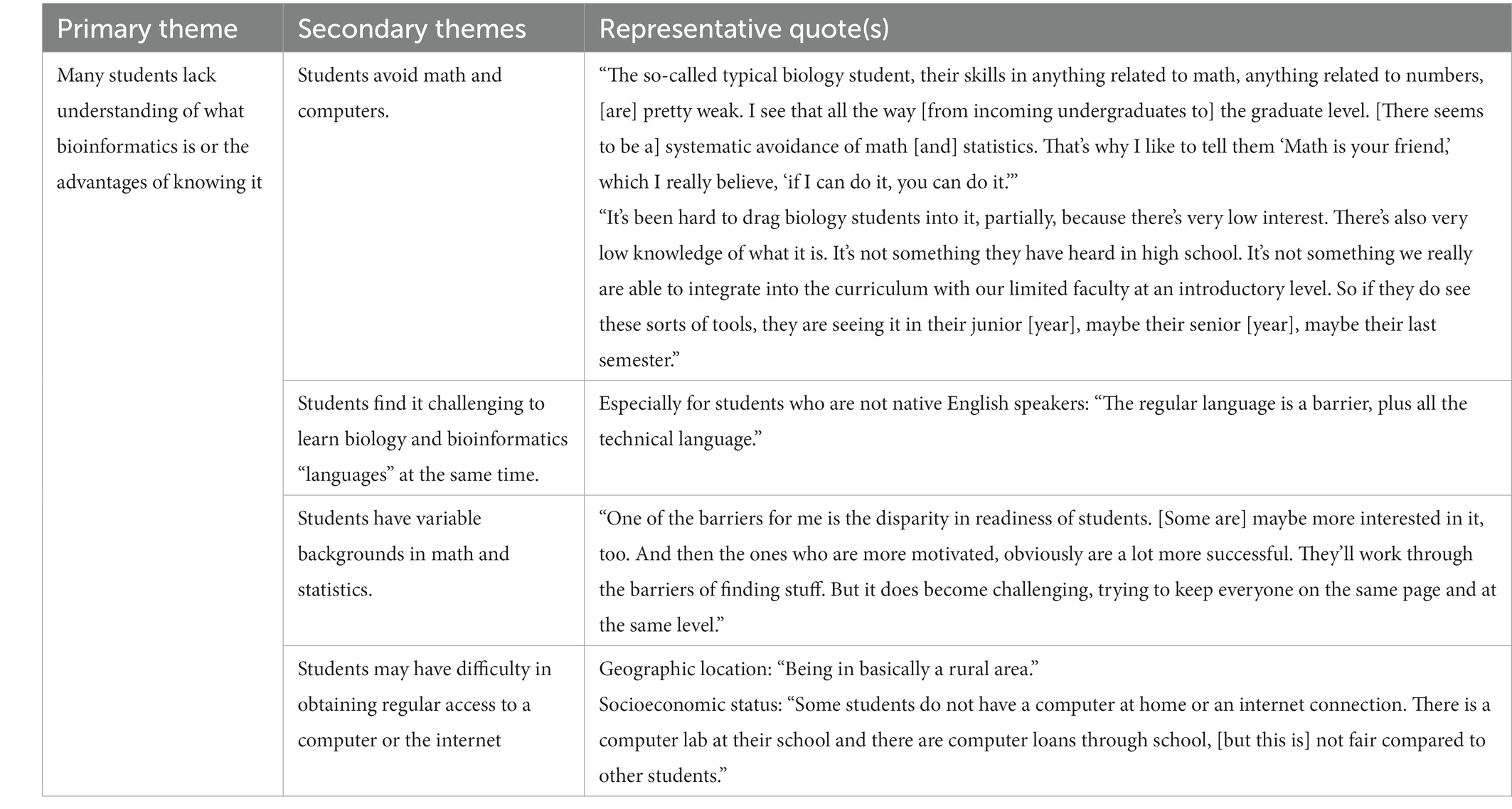What Does Bioinformatics Tutor Do?
What Does Bioinformatics Tutor Do?
Blog Article
The Best Guide To Bioinformatics Tutor
Table of ContentsSome Known Questions About Bioinformatics Tutor.The Best Guide To Bioinformatics TutorThe Of Bioinformatics TutorWhat Does Bioinformatics Tutor Do?Facts About Bioinformatics Tutor Revealed
Initial project growth is rather taxing, as it includes cautious planning of the subject, structuring of deliverables, and factor to consider of the skills and experience levels of individuals. As soon as a job has been plainly defined and implemented, it has the possible to be reused in future sessions with only minor alterations to show updates in the area or fit differences in individual backgrounds. This makes project-based learning a reliable and sustainable teaching approach in the future, especially in swiftly progressing disciplines like bioinformatics.To make certain connection and reproducibility of discovering, offering common lab note pads-- either physical or digital-- is important. These notebooks work as collective logs where pupils can tape their progress, code, methods, and results throughout the course. Not only do they reinforce discovering by urging paperwork and representation, but they likewise offer as post-course reference products that participants can get in touch with in future research or scholastic tasks.
Advisors play an important role in the success of project-based courses. Mentors likewise act as role models and motivate pupils to proceed seeking occupations in computational biology and associated fields.
5 Simple Techniques For Bioinformatics Tutor
One more key facet of the understanding procedure is offering participants the possibility to provide their job to others, especially to an audience beyond their prompt job group. Final discussions or mini-conferences allow trainees to articulate their searchings for, receive positive feedback, and gain confidence in connecting clinical content. This discussion component is often a favored among pupils, as it validates their initiatives and highlights the real-world relevance of their job.
Each iteration of the program was fine-tuned based on individual responses and evolving finest techniques in rearing. Bioinformatics Tutor. These adjustments ensured that the core goals-- hands-on understanding, collaboration, and applied analytical-- continued to be intact while broadening the deepness and breadth of subjects covered.
A significant visualization that captured participant belief was a word cloud generated from responses to the 2014 end-of-course survey. Participants were asked, "What was the very best component of the course?" and their responses were compiled into a graphical word cloud. In this representation, the size of each word suggests exactly how regularly it was mentioned, with words like "hands-on," "collaboration," "real-life issues," "advice," and "interactive" appearing most prominently. This visual comments reinforced the program's emphasis on experiential understanding and mentor support.
The contributions of individuals such as Rustici, G., Orchard, S., Cowley, A., and Twells, R., together with other members of the EBI user-training-working group, were crucial in improving the training course framework and material. Their insights helped form a versatile and inclusive design that might be adapted to different institutional and regional contexts.
Some Ideas on Bioinformatics Tutor You Need To Know

Jones, Rasmussen, and Moffitt (1997) also advocated for interdisciplinary learning via joint task job, noting its capability to mimic professional environments and prepare students for future scholastic or market functions. In an extensive review, Thomas (2000) evaluated multiple researches have a peek at this website on PBL and wrapped up that trainees not only perform well academically yet likewise establish a deeper understanding of the subject issue and boosted team effort skills.
In the context of bioinformatics education and learning, cutting-edge approaches like class video games and simulation-based training have also been used. For circumstances, Schneider and Jimenez (2013) presented using interactive games to teach organic information combination, enabling pupils to grasp intricate concepts through experiential understanding. This sort of gamification complements the hands-on understanding highlighted in project-based training courses by introducing a component of fun and competitors, which can further improve involvement.
Returning to the training course talked about below, the lessons gained from the application of project-based learning in a bioinformatics establishing have more comprehensive ramifications for various other STEM fields. The method stresses not just technological proficiency, however additionally communication, partnership, and critical reasoning-- abilities that are increasingly valued in both academia and sector.
3 Easy Facts About Bioinformatics Tutor Shown
The scalability of the program style likewise makes More Info it a feasible version for various other establishments. With ideal modification based upon neighborhood demands, readily available sources, and individual profiles, the framework can be replicated or adapted for usage in various other clinical domain names. Furthermore, the addition of structured mentorship and assessment strategies helps ensure regular top quality and quantifiable understanding results.

In conclusion, project-based learning in bioinformatics supplies an effective technique to mentor complex, interdisciplinary content in such a way that is both obtainable and intellectually promoting. By highlighting collaboration, practical application, and essential query, such efforts not only boost private knowing but additionally contribute to the cultivation of a brand-new generation of knowledgeable and innovative researchers.
Get This Report about Bioinformatics Tutor

Another key facet of the knowing procedure is supplying participants the possibility to provide their job to others, specifically to an audience past their instant task group.In the broader academic literature, project-based discovering (PBL) has been thoroughly examined and confirmed as an efficient approach for advertising deep understanding, crucial reasoning, and transferable skills. Adderley et al. (1975) emphasized the worth of project techniques in greater education, keeping in mind that they advertise active discovering and freedom. Schneider and Jimenez (2013) introduced the use of interactive video games to educate biological information assimilation, enabling trainees to grasp complicated principles via experiential knowing.
Report this page